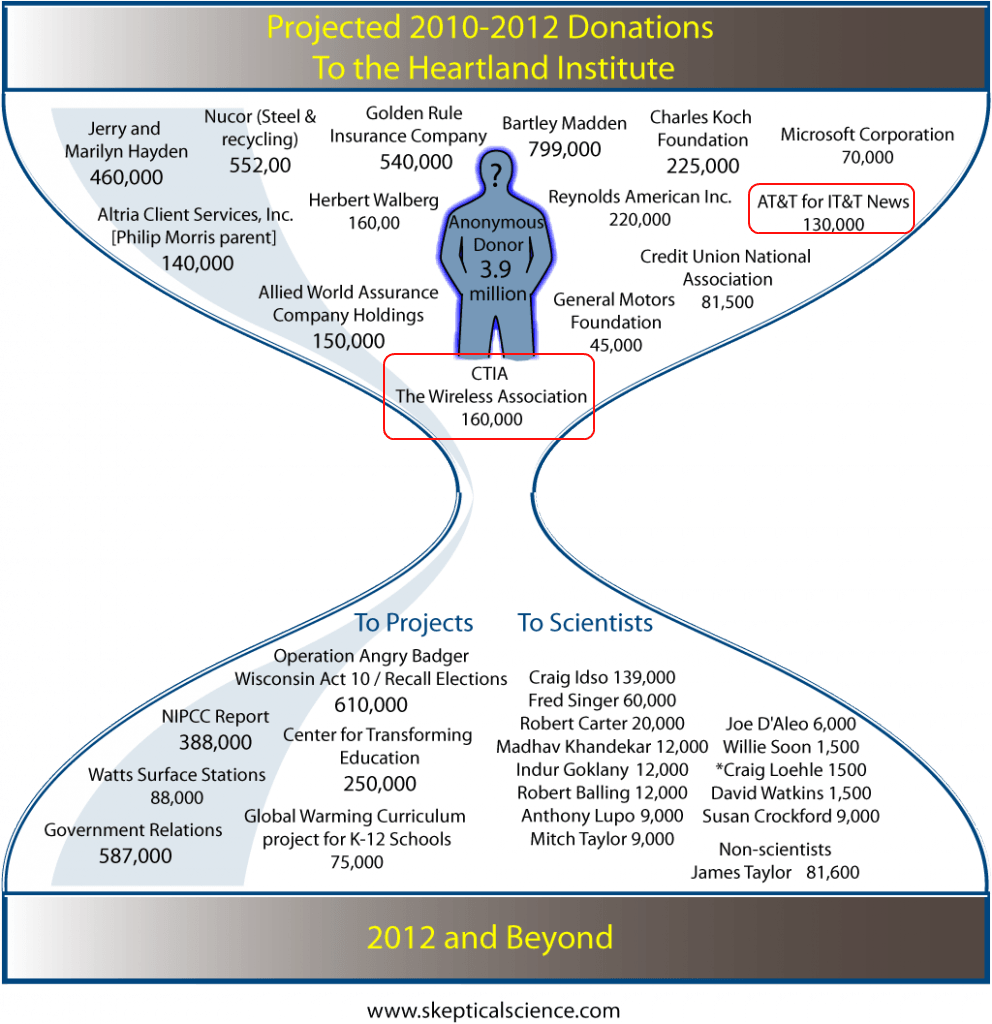
Skeptical Science produced this infographic of the Heartland Institute’s funding sources and where the money goes.
The Heartland Institute, a corporate-backed astroturf operation that has steadfastly supported cable and phone companies against the interests of consumers, has threatened legal action against activists, bloggers, and other journalists who published stories about recently-acquired documents connecting the group with major corporate donors.
Among telecommunications companies, both AT&T and Time Warner Cable show up in the alleged donor documents, which Heartland officials claim were obtained under false pretenses and, in some cases, were altered or forged.
Jim Lakely, communications director for the group, was unhappy:
We respectfully ask all activists, bloggers, and other journalists to immediately remove all of these documents and any quotations taken from them, especially the fake “climate strategy” memo and any quotations from the same, from their blogs, Web sites, and publications, and to publish retractions.
The individuals who have commented so far on these documents did not wait for Heartland to confirm or deny the authenticity of the documents. We believe their actions constitute civil and possibly criminal offenses for which we plan to pursue charges and collect payment for damages, including damages to our reputation. We ask them in particular to immediately remove these documents and all statements about them from the blogs, Web sites, and publications, and to publish retractions.
The fact the group implies it will take legal action against those who published stories not to the group’s liking will only draw added attention to the scandal. Stop the Cap! has tangled with this group several times over the years whenever AT&T and Time Warner Cable’s corporate agendas are being challenged.
The group has steadfastly refused to release their donor lists, at one point telling us, “by not disclosing our donors, we keep the focus on the issue.”
Not really. That’s because the first rule of politics is to “follow the money.” Most of these groups do not sing their songs for free, and knowing who paid the songwriter can be very revealing.
The Associated Press found no evidence Heartland’s budget or fundraising documents leaked to the media were faked or altered:
Because Heartland was not specific about what was fake and what was real, The Associated Press attempted to verify independently key parts of separate budget and fundraising documents that were leaked. The federal consultant working on the classroom curriculum, the former TV weatherman, a Chicago elected official who campaigns against hidden local debt and two corporate donors all confirmed to the AP that the sections in the document that pertained to them were accurate. No one the AP contacted said the budget or fundraising documents mentioning them were incorrect.
Heartland can best salvage its reputation and put this behind them by releasing the names of their largest donors, letting consumers decide whether this organization truly represents their interests, or those of the corporations writing the big checks. In addition to corporate contributions, Heartland’s operations rely on a single person identified only as “Anonymous Donor.” In the past six years, the man has given $14.26 million to the institute, nearly half its $33.9 million in revenue, according to the AP.
Grassroots this is not.


 Subscribe
Subscribe
Let’s start by saying I can see your point. However, Heartland are no different from all the lobbyists in the wind industry … except they didn’t corruptly run the Scottish Parliamentary Renewable Energy Group. In other words, the wind lobbyists in Scotland set the agenda for the Scottish Parliamentary group that look at renewable energy. Even 10 years later I simply cannot fathom how that was allowed to happen. Wind lobbyists, literally controlling … so setting … the agenda for groups in parliament. What would you say, if the Heartland Institute were running the senate’s meetings on broadband and even… Read more »
Yea like Comcast merger with NBC would not raise rates. Well a few weeks later my Comcast rates inseeacrd.Given the poor customer service and bad coverage from AT&T will this mean a lowering of quality for T-Mobile users?Those other carrier don’t have networks of their own they buy from the big providers. Fewer providers can impact their costs thus the prices for their customers as well.We broke up AT&T many years ago I don’t think it is good for consumers to move toward monopolies.
More K-Street walkers